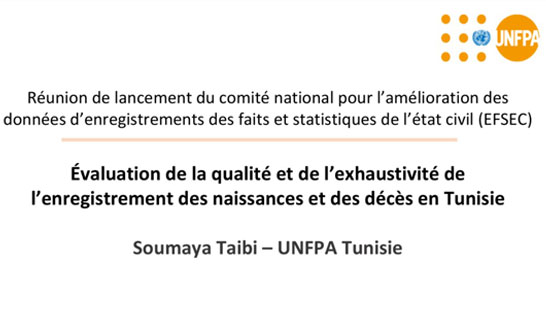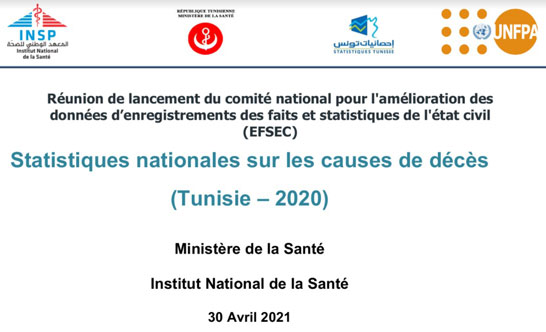POPULATION DYNAMIC
Completeness and quality of death and birth registration in Tunisia

Registration of births and deaths in Tunisia
In order to enhance civil registration and vital statistics at national and regional levels, the United Nations Population Fund in collaboration with the National Statistics Office undertook an assessment of the completeness and quality of birth and death registration data. The study covers the 2000–2018 period in Tunisia and concludes that:
- •Birth registration is complete
- •Estimated death registration completeness is above 95%
- •Death registration completeness across all governorates of Tunisia systematically improved between 2002-2017
- •Population data derived from census and vital registration are of high quality and can be used without adjustment when producing vital statistics
Links:
POPULATION DYNAMIC
Analysis of causes of deaths in Tunisia: a huge progress to showcase

National statistics on the causes of death in Tunisia
In April 2021, UNFPA Tunisia concluded its activities within the ConVERGE (“Connecting Vital Events Registration and Gender Equality”) Initiative led by UNFPA and International Development Research Centre - Centre of Excellence on CRVS Systems, Canada.
Through the ConVERGE initiative, UNFPA supported INSP in strengthening the skills of the cause of death coding unit, analyzing death registration data and raising the awareness of both the National CRVS partners and the general population on the importance of registering causes of death. The objectives were to:
- •Increase the coverage rate of Causes of Death Information System (CDIS) from the 2017 baseline: 40% to 60% in 2020.
- •Produce national statistics on the causes of death in 2020 and prepare a report on the main causes of death in 2020.
During this initiative, INSP changed the death certificate collection process from a passive reception of death certificates sent by municipalities to an active solicitation of "priority" municipalities to improve data centralization and sensitize municipality agents to the current problem of death certificates management’.
Therefore, unlike previous years, in 2020 INSP collected, entered and coded data simultaneously. This method allowed us to:
- •increase the national coverage rate of CDIS from the 2017 baseline: 40% to 61%.
- •increase the national coverage rate of CDIS at the governorate level to a minimum of 15%, especially in the governorates where death certificate collection’ was previously 0%.
- •improve the quality of causes of death coding: Vital Statistics Performance Index for Quality from 31.8% in 2017 to 53% in 2020.
- •produce national statistics on the causes of death in 2020 and prepare a report on the main causes of death in 2020.
The analysis of 46,420 death certificates in 2020, underlined the crucial position of COVID19 as an emerging health problem, in Tunisia, source of mortality and premature mortality; alongside other non-communicable diseases, Type II Diabetes, cerebrovascular diseases and malignant tumors.
In fact, Diabetes, cerebrovascular disease and COVID-19 were the top three causes of death for both sexes. COVID-19 was the leading cause of death for men (6,9%) and the third for women (5,1%). In addition, certain specificities linked to sex were underlined; In women, hypertensive diseases were ranked fourth, accounting for 4.3% of all female deaths, and in men, malignant tumors of the trachea, bronchi and lungs were ranked fourth representing 5.8% of all male deaths followed by ischemic heart disease (4.9%).
It is important to mention that the assessment of CDIS database revealed that only 4 of the maternal deaths registered by the Maternal and Perinatal Death Surveillance and Response (MPDSR) system in 2017 were captured in the CRVS. In 2020, 46 to 80 percent of codes registered by governorate are garbage codes and sex was not specified in 8.7% of the death certificates received.
POPULATION DYNAMIC
Activation of the national committee on CRVS
As part of Tunisia's commitment to the Sustainable Development Agenda 2030 which stipulates the strengthening of national statistical capacities through the improvement of the registration of civil status statistics, and to ensure continuity in the generation and management of reliable vital statistics data, at both national and sub-national levels, the National Statistics Institute (INS), with the support of the United Nations Population Fund (UNFPA ), held on April 30, 2021, a first meeting to launch a national CRVS committee.
The meeting saw the participation of 18 participants from the main actors involved on CRVS: Ministry of local affairs and the environment, National Institute for Statistics, Main directorates of the ministry of Health (Primary Healthcare Directorate, Planning and studies department, General Directorate of Public Health Structures), National Institute for Public Health and WHO representatives. The discussions tackled mainly the role of a national CRVS committee, the membership and the priorities in terms of next steps.
The organization of this meeting is considered a success for itself, as it was postponed and deprioritized for few years now; in addition to that, the different representatives of national institutions showed a huge engagement toward the improvement of CRVS in Tunisia; including improvement of coordination with ministries that are usually absent from these discussions.
